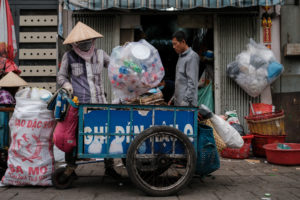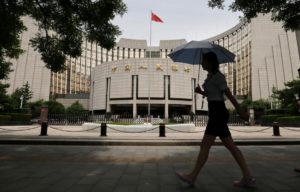Encased in the walls of a vocational training school in southern Vietnam’s Tra Vinh province are 6,000 bottles stuffed with plastic wrappers, straws, bags and food packaging. The trash-filled bottles, covered in cement render, have replaced clay bricks in the country’s first “eco-brick” school, which opened late last year.
Annual plastic consumption in Vietnam increased from 3.8 kilograms per person in 1990 to more than 41 kilograms in 2018; a surge that WWF Vietnam’s plastic policy and partnership manager, Pham Manh Hoai, called “astounding”.
“Cities will continue to experience rapid urbanisation and economic growth, and plastic production and consumption will also increase,” he said. “This puts extreme pressure on local waste-management systems and leads to the country’s concerning levels of plastic leakage.”

Vietnam disposes of approximately 3.9 million tonnes yearly. Just a third of that is recycled. The rest is burnt, buried in landfills or dumped directly into the environment, where it can leak into the country’s waterways and eventually the global ocean.
Although grassroots efforts and social franchises are working to combat plastic pollution in Vietnam, these initiatives are up against mountains of trash and the lack of an official system for sorting and recycling waste. Ve chai, informal waste workers, collect and sell the few plastic materials recycled in the country: clear plastic bottles and hard plastics commonly used for toiletries like shampoo.
But as of January, revisions to Vietnam’s Law on Environmental Protection have made municipalities responsible for recycling, something the informal sector has generally done. It is unclear how the new regulations will be implemented and enforced, with the formal sector currently ill-equipped to manage waste.
Opportunities
Jan Zellmann, co-founder of ReForm Plastic, which transforms low-value plastics into boards that can be used in furniture, waste bins and other objects in Vietnam and beyond, told China Dialogue that changes to Vietnam’s recycling mechanisms will be a slow transition with cities needing to build up capacities.
“It’s about the infrastructure, it’s about process, it’s about management capacity – they don’t have it,” he said. “It’s going to be a very gradual change and transition.”

According to research published in 2020, Vietnam is the world’s 11th biggest contributor to mismanaged plastic waste, meaning plastic that ends up in the environment rather than being dealt with via incineration, secure burial or recycling. In 2016, the country produced 570,000 metric tonnes of such waste.
Over one tonne of plastic waste was collected for the eco-brick school project from all over Vietnam. Tan Meftah, founder of the sustainability-focused organisation Wholistik Permaculture, dreamed up the project to recycle and build awareness around plastic pollution in Vietnam.
Meftah collaborated with Jimmy Thai of Build a School Foundation, an NGO based in the United States that has built nearly 100 schools, primarily in Vietnam.
Hundreds of people, including many school children, were involved in gathering waste and making bricks. They collected trash from Tra Vinh, Hanoi, the beaches of central Hoi An, walking paths along Ho Chi Minh City’s Nhieu Loc-Thi Nghe Canal, and household waste.
The bricks were eventually trucked to Tra Vinh, stacked, caged in chicken wire and covered with cement to fill out the frame of the school.

Thai told China Dialogue that a library for elementary school students is now being built out of eco-bricks in Vietnam’s ancient capital, Hue. “We have already collected 3,000 bottles,” he said.
The second eco-brick effort is focused on collecting trash and building bricks near the library to reduce emissions from bringing bricks in from across the country. With plastic waste strewn over much of Vietnam, eco-bricks have the potential to be used more broadly as a free building material for all kinds of structures, Meftah said.
Still, it’s tedious and takes a long time to make an eco-brick, Meftah told China Dialogue, and regular bricks are cheap.
“You can work for days and days and days and barely get 20 or 30 bricks,” he said. “We needed around 6,000 bricks for 100 square metres.”
As good as the eco-brick initiative is at building education around plastic pollution and reducing waste, the plastic collected is just a “drop in the bucket”, Thai said.
“Whatever we do here is really great for awareness, but I think it will be extremely challenging to make a difference,” he said.
Making boards
Kasia Weina and Jan Zellmann co-founded ReForm Plastic after realising there was no way to recycle low-grade plastics in Vietnam.
“There weren’t any solutions available to actually handle this type of waste,” Weina told China Dialogue. “It was just being either burned or dumped at best.”


The team set up its first factory making plastic boards from waste in 2020 in Hoi An, a UNESCO heritage site in central Vietnam. Hoi An’s landfill has been full for two or three years, Weina said. It is being mined and the waste shipped about 47 kilometres south to a new landfill in the city of Tam Ky.
With an office based in neighbouring Danang, ReForm partners directly with the municipality to collect low-grade plastics and works with schools, hotels, offices, restaurants and bars to gather plastic trash.
At the Hoi An factory, that waste is washed, dried, shredded into flakes and put through a compression moulding machine to form boards – a production method originally designed for wood or other, composite materials.

Late last year, ReForm expanded its operations by connecting with the Thanh Tùng 2 (TT2) waste-processing site in Dong Nai province, about one and a half hours outside Ho Chi Minh City. TT2 receives approximately 30 tonnes of plastic post-industrial waste daily.
The waste originates from southern industrial parks. It is shredded, loaded into a hot press, and cooled under pressure. It’s then ready to be sold at prices competitive to its wood-based alternative.
Before the collaboration with ReForm, TT2’s manager Huynh Phuoc Loc said the plastic waste collected at TT2 had been incinerated or flaked then resold.
City problems
The new Environmental Protection Law that went into effect this January has turned cities into waste managers, in charge of managing and recycling it.

The problem is, no one knows how they are going to do it. Formal waste collection has traditionally done nothing more than collect trash from homes and businesses and take it to landfills or burn sites. Moreover, ve chai, who have been the driving force of recycling in Vietnam, may lose out.
“With the new law and regulation, we expect a significant shift,” Zellmann said. “That could have a really negative impact on the informal waste sector.”
Plastic bottles collected by ve chai can currently be sold to waste-processing centres in Central Vietnam for 5,000 to 7,000 Vietnamese dong (22 to 31 US cents) per kilogram of plastic.
Plastics are resold by the operators of these centres. They are often shredded or made into pellets there and sold to factories in Vietnam and China, where they are used to make synthetic fabrics and new plastic products.
It’s uncertain how informal waste workers could be integrated into new recycling schemes. But they missed out on government relief packages during the pandemic, and formalising their work could bring them benefits such as health insurance.

The changes to Vietnam’s recycling sector are likely to unfold slowly as planning, infrastructure investment and enforcement are required.
“It’s going to take years till the municipal waste operators actually even have the infrastructure or the transport means to collect the waste in a separate way,” Zellmann said.
“A lot of cities look at who is the first mover, who is doing something because they all don’t want to do anything… It’s slowly starting, but it’s early days.”






